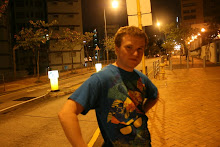So, sometimes you can tell a lie to get at a greater, capital-T "Truth." That, essentially, is the point of O'Brien's essay and according to him, the point of a good war story. But how does this happen?
It reminds me of the movie Platoon. That movie isn't based on a true story, and no real platoon in Vietnam had an experience as terrible as that one, but the movie manages to include all the terrible things about Vietnam in one film. The film manages to tell the "true" Vietnam story without actually telling a true story.
Can I think of anything similar?
A lot of creative nonfiction seems this way. Not necessarily true, but at the same time very True. I wonder, though, how untrue something can be before it stops being nonfiction? If I wrote a story about my family, and everyone read it and said "but I never did that!" would it be O.K. as long as it expressed some general Truth? This just occurred to me: Is James Joyce's "Dubliners" and "Portrait of the Artists as a Young Man" creative nonfiction, or even some kind of early precursor? Is any semi-autobiographical work creative nonfiction? What about Tobias Wolff's "Old School" some kind of creative nonfiction?
Is this even relevant? Damn me, I'm such a discussion de-railer.
Thursday, October 1, 2009
Subscribe to:
Comments (Atom)
